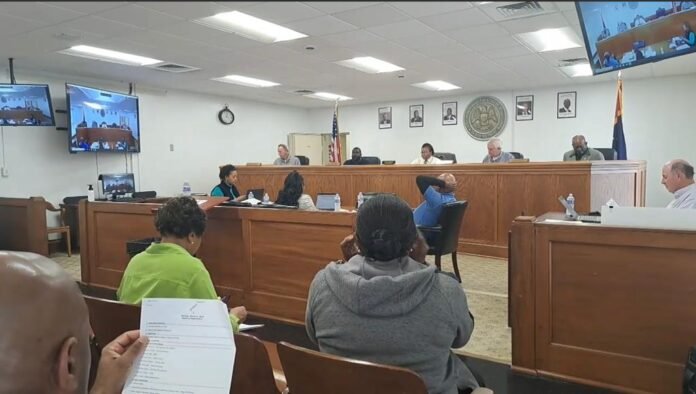By Josh Troy
Clarksdale Advocate
The Coahoma County Board of Supervisors voted unanimously at Monday’s meeting to make Jonestown a $20,000 sub-award recipient of American Rescue Plan Act funds to be used for capital improvements, but, in the process, discussion surfaced about how the money could be allocated for various projects. The Board of Supervisors has a total of $4.2 million of ARPA funds. Consultant Andrew Smith, who is advising the Board of Supervisors on how to spend ARPA funds, said the $20,000 could be allocated for capital improvements in Jonestown because it was a “disproportionately affected area by the coronavirus pandemic.”
The capital improvement money will be used to remove dilapidated structures and clean debris. “It meets the eligibility requirements, and my recommendation is that you would approve the board order that has been presented in its final form,” Smith said. “All of the eligibility requirements have been met. If it is the board’s wish to provide funds to them, they would be what’s considered under the ARPA legislation final rule, as a sub-award recipient.” Smith said there would have to be an agreement between Jonestown and the Coahoma County Board of Supervisors. He added Jonestown would provide monthly reports.
“I think it helps the County to manage with giving monthly reports,” he said. Jonestown would send Coahoma County an invoice and a “copy of a check prepayer.” At that time, the County would send Jonestown a check to make payments for the work. Coahoma County Board Attorney Tom Ross said Jonestown officials would identify the work that would be completed. “They’re doing the necessary legal work, identifying the property,” he said.
Board President and District 4 Supervisor Johnny Newson asked what the rules would be to award Clarksdale Animal Rescue Effort and Shelter ARPA funds. At previous meetings, CARES representatives approached the Board of Supervisors, asking for $150,000 in ARPA funds. It was also agreed after the County received $4.2 million in ARPA funds, each Supervisor would be able to determine where $100,000 of the money goes for special projects. At the Feb. 15 meeting, the board voted for each Supervisor to decide how much of his $100,000 in special project funds would go toward CARES.
Smith said both CARES and the Aaron E. Henry Community Health Center could be sub-award recipients for ARPA funds, like Jonestown. The Aaron E. Henry Community Health Center submitted a proposal requesting funds to improve Sasse Park. A service drive to access the Sasse Park from Sasse Street is being installed along with walking and bike paths, a parking lot and drop-off area, lighting and site drainage, electric charging stations for vehicles and scooters, bike racks throughout the park, and benches. “If they’re going to be considered a sub-award recipient of ARPA funds, everybody’s going to have to have that board order to enter into an agreement with the County,” Smith said.
Newson said he did not want it to take a while when an organization comes to the Supervisors requesting APPA funds. “I’m very much concerned about these requirements,” he said. “I know there are legalities put into ARPA requirements, but at the same time, I feel when people come before us, we might need to give them a checklist, so they will know what is required.” District 1 Supervisor Paul Pearson asked Smith if he had met with CARES officials about their request. Smith said he was unaware that CARES requested funding. “I was completely in the dark, all lights out,” he said.
Coahoma County Road Manager Otis Griffin brought two bids for a chainlink fence at the County Jail, and ARPA funds would be used to pay for it. Griffin said Academy Fencing out of Columbus submitted a bid for $29,125, while West Memphis Fencing Construction out of West Memphis, Ark., submitted a bid for $33,800. The board unanimously voted to carry the issue forward until the next meeting. Both are a six-foot vinyl chain link fence with a sliding gate.
Griffin said he wanted to purchase the one from West Memphis Fencing Construction. He acknowledged it was more expensive but said West Memphis Fencing Construction would include 75 access cards, and an access card would provide access to get past the fence. Smith agreed. “The one from West Memphis seems to be a better product based on what they submitted, but the one from Academy Fence Company out of Columbus, Miss., their final submission is $29,195,” he said. Ross said if the board voted to use ARPA funds for the more expensive fence, a letter stating the reason should be included in the meeting minutes. Pearson said Academy Fencing should also be given the opportunity to include the same things as West Memphis Fencing Construction was offering with its bid.



